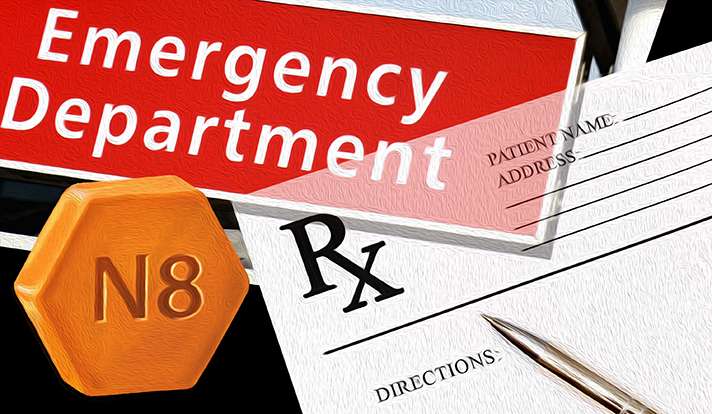Patients with opioid addiction benefit from treatment initiated in ED

Patients addicted to opioids often seek care in the emergency department (ED). They are more likely to receive addiction treatment, and reduce opioid use long-term if they are started on medication to reduce cravings in the ED, according to a new Yale study.
The benefits of such treatment persist for two months after the initial visit to the ED, the researchers said. The study, led by chair of emergency medicine Dr. Gail D'Onofrio and professor of medicine Dr. David Fiellin, was published in the Journal of General Internal Medicine.
In a prior study, the Yale research team found that individuals with opioid addiction who were treated with medication in the ED were more likely to get treatment beyond the ED and lessen their opioid use. Yet it was not known how long the benefits of medication initiated in the ED would last.
In the long-term follow-up from the randomized trial, the Yale team provided one of three interventions to 290 individuals with opioid addiction who visited the ED. Patients received a referral to addiction treatment services; or a brief interview including discussion of treatment; or a brief interview together with the medication buprenorphine. The third group continued medication in primary care.
The research team evaluated patients at two, six, and 12 months following the ED interventions. For each individual, they assessed participation in addiction treatment, opioid use, and HIV risk, in addition to taking urine tests.
At the end of two months, patients who received buprenorphine from the ED were more likely to be in formal addiction treatment, and also to report reduced opioid use, compared to the other groups. There were no significant differences in HIV risk or the urine test results.
"The ED visit is an ideal opportunity to identify patients with opioid use disorder and initiate treatment and direct referral, similar to best practices for other diseases, such as high blood pressure and diabetes," said D'Onofrio.
The findings add to mounting evidence that medication treatment for opioid users, initiated in the ED and continued in primary care, improves outcomes for patients as long as the intervention is continued. The researchers are currently leading an NIH-funded study disseminating this model in emergency departments in four cities around the country.
More information: Gail D'Onofrio et al. Emergency Department-Initiated Buprenorphine for Opioid Dependence with Continuation in Primary Care: Outcomes During and After Intervention, Journal of General Internal Medicine (2017). DOI: 10.1007/s11606-017-3993-2
















